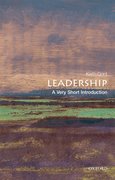
By Keith Grint
Some of my more radical academic colleagues remain inordinately sceptical of the role of individual leaders set against the tectonic plates of economic systems, social classes, genders, political alliances and ethnic groups. To suggest that individual leaders might make a difference is to place an unwarranted responsibility upon mere actors when the real issue is ‘the system’ — whatever the system is. However, I want to suggest that we look again at permission-giving as just one aspect that encourages or discourages followers from specific acts. Let me turn to an apocryphal story from the Korean War to illustrate this. As in the Second World War, the American Army (like the British army but unlike the German army) removed discretion at the lower echelons and deposited most knowledge and decision-making within the officer corps. As a consequence when Allied troops landed on D-Day in Normandy German soldiers targeted Allied officers as the most effective way to immobilize the invaders. In the Korea War little seemed to have changed; when American soldiers were captured their North Korean captors frequently resorted to torturing American officers — since the ordinary soldiers seldom had significant information — and as a consequence American soldiers were required to strip their emblems of rank if capture looked likely. This left the North Koreans with a problem: how to determine the officers amongst a group of captured US soldiers? The result, according to the apocryphal version of events, was that one enterprising North Korean interrogator demanded that all the American soldiers in his charge remove their trousers — at which point everyone looked at their officer for permission to strip.
This ‘permission-giving’ aspect of leadership is a critical, and critically under-rated, aspect. In Neil Mitchell’s book, Agents of Atrocity, he argues that leaders make a crucial difference in the occurrence, or prevention, of human rights abuses through their permission-giving. Thus rather than assuming that context determines the actions of leaders he suggests that leaders always retain a degree of choice in both their, and their followers’, actions. In effect, some leaders allow or even encourage their followers to engage in mass rape and murder after conquest while others actively prevent it. The most interesting case is Oliver Cromwell. In the English aspect of the English Civil War the pillaging of captured cities was common on both sides until the rise of the Parliamentary New Model Army, under Cromwell. That group was specifically forbidden from engaging in the rape, murder, and looting that hitherto had been commonplace. In contrast, when Cromwell led the army into Ireland he didn’t actively prevent any such brutality, and the consequences were the sacking and butchery of Drogheda and Wexford.
Note here that the critical point is how leaders and their followers are not driven into bestial behaviour as a response to a bestial situation; on the contrary, and in sharp contrast to contingency theory, what people do is a consequence of the choices they make, albeit constrained choices. This being the case we might look afresh at whether we should focus on the provision of material sustenance in areas of conflict — water, food, money, jobs, security and so on — or turn instead to the ideological aspects of life. We know historically that people in terrible material conditions don’t automatically revolt when food is short or jobs are scarce. They revolt when an alternative appears viable to a terrible present. We can see this captured in the history of slavery. It was probably common to almost all forms of prior human society and is usually linked to terrible material circumstances, but revolts aren’t a permanent or ever present feature of slave history.
When we apply this to other aspects of society it becomes clear just how important leadership is in its permission-giving — or withholding — capacity. Public assaults upon the Jews in Germany were significantly increased once Hitler had publicly denounced Jews. At the same time racist statements in public in the UK are now much rarer than they used to be because the leading role of the law and the political establishment has rendered such comments beyond the pale. But we do not need to wander into the political arena to notice the importance of permission-giving. According to the Guardian, the Queen’s adoption of the Stocky Heel shoe is responsible for the surge in demand and we only have to watch whatever Kate Middleton is wearing to see sales of the same dress race out of the shops. Permission-giving even affects suicide patterns with copy-cat suicides common.
Might it be then, that a hugely important aspect of leadership is not so much what ‘the situation’ or the ‘system’ determines or facilitates but what individual leaders permit or prohibit through their active or passive leadership?
Keith Grint is Professor of Public Leadership at Warwick Business School. He is the author of Leadership: A Very Short Introduction (2010).
The Very Short Introductions (VSI) series combines a small format with authoritative analysis and big ideas for hundreds of topic areas. Written by our expert authors, these books can change the way you think about the things that interest you and are the perfect introduction to subjects you previously knew nothing about.
Subscribe to the OUPblog via email or RSS.
Subscribe to only VSI articles on the OUPblog via email or RSS.
View more about this book on the ![]()
![]()


[…] friends at the OUP blog submitted a fascinating introduction to the idea that permission-giving is a crucial aspect of […]